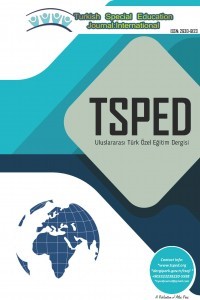Gazze'de Kapsayıcı Eğitim Uygulamalarının Öğretmen Görüşlerine Göre Değerlendirilmesi
This research concerns itself to examine teachers’
perception of inclusive education in three constructs of inclusive education in
the Gaza City, namely comfort level when engaging with people with
disabilities, acceptance of learners with different needs, and concerns about
inclusive education. A random sample of in-service educators was selected. The
analytic descriptive method was used and the SACIE Scale was used after
standardizing the scale on the Gaza City environment. The result showed that
the scale is reliable and valid, the outcomes also revealed that teachers have
high level of concerns, low levels of comfort and acceptance toward inclusive
education, those levels indicate to some extent negative perception about
inclusive education. In addition, the outcome revealed statistically
significant differences in the levels of comfort, acceptance, concerns and the
total score of the scale among teachers due to specific variables.
Anahtar Kelimeler:
Özel Eğitim, Kapsayıcı Eğitim, Gazze
Teachers’ Perception of Inclusive Education in Gaza City
This research concerns itself to examine teachers’
perception of inclusive education in three constructs of inclusive education in
the Gaza City, namely comfort level when engaging with people with
disabilities, acceptance of learners with different needs, and concerns about
inclusive education. A random sample of in-service educators was selected. The
analytic descriptive method was used and the SACIE Scale was used after
standardizing the scale on the Gaza City environment. The result showed that
the scale is reliable and valid, the outcomes also revealed that teachers have
high level of concerns, low levels of comfort and acceptance toward inclusive
education, those levels indicate to some extent negative perception about
inclusive education. In addition, the outcome revealed statistically
significant differences in the levels of comfort, acceptance, concerns and the
total score of the scale among teachers due to specific variables.
Keywords:
Inclusive Education, Gaza City, Special Education,
___
- Agbenyega, J. (2007). Examining teachers’ concerns and attitudes to inclusive education in Ghana. International Journal of Whole Schooling, 3(1), 41–56. Retrieved from http:// www.wholeschooling.net/Journal_of_Whole_Schooling/IJWSIndex.html
- Alghazo, E. M., & Gaad, E. E. N. (2004). General education teachers in the United Arab Emirates and their acceptance of the inclusion of students with disabilities. British Journal of Special Education, 31(2), 94–99. doi:10.1111/j.0952-3383.2004.00335.x
- Avramidis, E., & Norwich, B. (2002). Teachers’ attitudes towards integration/inclusion: A review of literature. European Journal of Special Needs Education, 17(2), 129–147. doi:10.1080/08856250210129056
- Burke, K., & Sutherland, C. (2004). Attitudes towards inclusion: Knowledge vs. experience. Education, 125(2), 163–172.
- Campbell, J., Gilmore, L., & Cuskelly, M. (2003). Changing student teachers’ attitudes towards disability and inclusion. Journal of Intellectual and Developmental Disability, 28(4), 369–379. doi:10.1080/13668250310001616407
- Changpinit, S., Greaves, D., & Frydenberg, E. (2007). Attitudes, knowledge, concerns, and coping strategies regarding inclusive education in community of Thai educators, The 1st International conference on Educational Reform, Mahasarakham University, Thailand. Retrieved from http://www.icer.msu.ac.th/ICER2007/paper/CI03.pdf
- Chris,F. Chris,E Tim,L.(2011) the Sentiments ,attitudes, and Concerns about inclusive education Revised Scale for measuring pre-service teachers perception about inclusion. Exceptionality education International,vgl,21 no.3.
- Forlin, C. (2008). Education reform for inclusion in Asia: What about teacher education? In C. Forlin & M.
- G. J. Lian (Eds.), Reform, inclusion & teacher education: Towards a new era of special education in the Asia-Pacific region (pp. 61–73). Abingdon: Routledge.
- Forlin, C. (2010a). Re-framing teacher education for inclusion. In C. Forlin (Ed.), Teacher education for inclusion: Changing paradigms and innovative approaches (pp. 3–10). Abingdon: Routledge.
- Forlin, C., & Chambers, D. (2011). Teacher preparation for inclusive education: Increasing knowledge but raising concerns. Asia Pacific Journal of Teacher Education, 39(1) 17–32. doi:10.1080/1359866X.2010.540850
- Gause, C. P. (2011). Diversity, equity, and inclusive education: A voice from the margins. Rotterdam, Netherlands: Sense. Government of the United States of America. (2001). No child left behind act. United States Government: Washington, DC.
- Harvey, M. W., Yssel, N., Bauserman, A. D., & Merbler, J. B. (2010). Preserves teacher preparation for inclusion. Remedial & Special Education, 31(1), 24–33.doi:10.1177/0741932508324397
- Jordan, A., Schwartz, E., & McGhie-Richmond, D. (2009). Preparing teachers for inclusive classrooms. Teaching and Teacher Education, 25(4), 535–542. doi:10.1016/j.tate.2009.02.010
- Ministry of Education. Inclusive education Manual (2014) Palestine, Ramallah.
- Richards, H., Brown, A., & Forde, T. (2009). Practitioner brief. Addressing diversity in schools: Culturally responsive pedagogy. AZ:.National Center for Culturally Responsive Educational Systems (NCCRESt), Arizona State University.
- Sharma, U., Forlin, C., & Loreman, T. (2008). Impact of training on pre-service teachers’ attitudes and concerns about inclusive education and sentiments about persons with disabilities. Disability & Society, 23(7), 773–785. doi:10.1080/09687590802469271
- Symeonidou, S., & Phtiaka, H. (2009). Using teachers’ prior knowledge, attitudes and beliefs to develop in-service teacher education courses for inclusion. Teaching & Teacher Education, 25(4), 543–550. doi:10.1016/j.tate.2009.02.001
- UNESCO. (1990, March). World declaration on education for all: Meeting basic learning needs. Paper presented at the World Conference on Education for All, Jomtein, Thailand. Abstract retrieved from http://www.un-documents.net/jomtien.htm
- UNESCO. (1994). The Salamanca statement and framework for action on special needs education. Adopted by the world conference on special needs education: access and equity. Paris: Author.
- UNESCO. (2000, April). Dakar framework for action, education for all: Meeting our collective commitments. Paper presented at the World Education Forum, Dakar, Senegal.
- United Nations. (2006). Convention on the right of persons with disabilities. Retrieved from http://www.un.org/disabilities/convention/conventionfull.shtml
- United States Department of Education. (2004). Individuals with Disabilities Improvement Act. United States Government: Washington, DC.
- Woolfson, L. M., & Brady, K. (2009). An investigation of factors impacting on mainstream teachers’ beliefs about teaching students with learning difficulties.
- ISSN: 2630-6123
- Başlangıç: 2018
- Yayıncı: Atlas att. dış tic. bilg. kırt. ve gd. ltd. şti
Sayıdaki Diğer Makaleler
Gazze'de Kapsayıcı Eğitim Uygulamalarının Öğretmen Görüşlerine Göre Değerlendirilmesi
